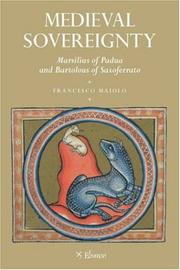| Listing 1 - 4 of 4 |
Sort by
|
Book
ISBN: 1139343378 1108051405 Year: 2013 Publisher: Cambridge : Cambridge University Press,
Abstract | Keywords | Export | Availability | Bookmark
 Loading...
Loading...Choose an application
- Reference Manager
- EndNote
- RefWorks (Direct export to RefWorks)
Cecil Nathan Sidney Woolf (1887-1917), Fellow of Trinity College, Cambridge, was killed in the First World War. In this prize-winning book Woolf examines the way in which the medieval jurist Bartolus of Sassoferrato (1314-57) interprets the Roman Law to make it relevant to 14th-century Italian political reality. Considering Bartolus's treatment of the relationships between the Roman Empire and the papacy, kingdoms and city-republics, Woolf places Bartolus's thought in its wider historical context by surveying the complex problem of the empire from the mid-13th century onwards. In particular, he assesses Bartolus's most famous argument that the city is its own emperor. Arguing that Bartolus's influence lasted into the early modern period, both in the practice of law and in the use made of his works by writers like Bodin and Albericus Gentilis.
Political science --- History. --- Bartolo, --- Holy Roman Empire --- State, The --- History of theories --- Alphanis, Bartolus Severus de, --- Bartholus, --- Bartole, --- Bartolus, --- Bartolus de Saxoferrato, --- Bartolus Severus de Alphanis, --- Sasferrato, Bartole da, --- Sassoferrato, Bartolo of, --- Saxo Ferrato, Bartholus de, --- Saxoferrato, Bartolus de,
Book
ISBN: 131651353X 1009072811 1009075721 1009075527 Year: 2022 Publisher: Cambridge : Cambridge University Press,
Abstract | Keywords | Export | Availability | Bookmark
 Loading...
Loading...Choose an application
- Reference Manager
- EndNote
- RefWorks (Direct export to RefWorks)
Family was a central feature of social life in Italian cities. In the Renaissance, jurists, humanists, and moralists began to theorize on the relations between people and property that formed the 'substance' of the family and what held it together over the years. Family property was a bundle of shared rights. This was most evident when brothers shared a household and enterprise, but it also faced overlapping claims from children and wives which the paterfamilias had to recognize. Thomas Kuehn explores patrimony in legal thought, and how property was inherited, managed and shared in Renaissance Italy. Managing a patrimony was not a simple task. This led to a complex and active conceptualization of shared rights, and a conscious application of devices in the law that could override liabilities and preserve the group, or carve out distinct shares for each member. This wide-ranging volume charts the ever-present conflicts that arose and were a constant feature of family life.
Marital property. --- Bartolo, --- Albericus, --- Marital property --- Matrimonial property --- Property, Marital --- Husband and wife --- Property --- Law and legislation --- Alberic, --- Alberich, --- Alberico, --- Albericus de Rosate, --- Rosate, Albericus de, --- Rosciate, Alberico da, --- Alphanis, Bartolus Severus de, --- Bartholus, --- Bartole, --- Bartolus, --- Bartolus de Saxoferrato, --- Bartolus Severus de Alphanis, --- Sasferrato, Bartole da, --- Sassoferrato, Bartolo of, --- Saxo Ferrato, Bartholus de, --- Saxoferrato, Bartolus de, --- Inheritance and succession --- Fideicommissum --- Inventories of decedents' estates --- Wills --- History --- Soccini, Bartolommeo, --- Decio, Filippo,

ISBN: 9789059720817 9059720814 Year: 2007 Publisher: Delft Eburon
Abstract | Keywords | Export | Availability | Bookmark
 Loading...
Loading...Choose an application
- Reference Manager
- EndNote
- RefWorks (Direct export to RefWorks)
Sovereignty --- Constitutional history, Medieval. --- State, The --- Law, Medieval. --- Souveraineté --- Histoire constitutionnelle médiévale --- Etat --- Droit médiéval --- History --- History. --- Histoire --- Marsilius, --- Bartolo, --- Medieval law --- State sovereignty (International relations) --- International law --- Political science --- Common heritage of mankind (International law) --- International relations --- Self-determination, National --- Law and legislation --- Alphanis, Bartolus Severus de, --- Bartholus, --- Bartole, --- Bartolus, --- Bartolus de Saxoferrato, --- Bartolus Severus de Alphanis, --- Sasferrato, Bartole da, --- Sassoferrato, Bartolo of, --- Saxo Ferrato, Bartholus de, --- Saxoferrato, Bartolus de, --- Mainardini, Marsiglio da, --- Mainardinus, Marsilius, --- Marsiglio Mainardino, --- Marsiglio, --- Marsilio, --- Marsilyus, --- Menandrinus, Marsilius, --- Raymundinis, Marsilius de, --- מארסיליוס, מפאדובה, --- Souveraineté --- Histoire constitutionnelle médiévale --- Droit médiéval --- Constitutional history, Medieval --- Law, Medieval
Book
ISBN: 8822231686 9788822231680 Year: 1983 Volume: 11 Publisher: Firenze Olschki
Abstract | Keywords | Export | Availability | Bookmark
 Loading...
Loading...Choose an application
- Reference Manager
- EndNote
- RefWorks (Direct export to RefWorks)
Political science --- History --- Early works to 1800 --- Bartolo, --- -Political science --- -Fourteenth century --- Law, Medieval --- Medieval law --- 14th century --- Middle Ages --- Administration --- Civil government --- Commonwealth, The --- Government --- Political theory --- Political thought --- Politics --- Science, Political --- Social sciences --- State, The --- Bartolo of Sassoferrato --- -Contributions in political science --- History. --- Alphanis, Bartolus Severus de, --- Bartholus, --- Bartole, --- Bartolus, --- Bartolus de Saxoferrato, --- Bartolus Severus de Alphanis, --- Sasferrato, Bartole da, --- Sassoferrato, Bartolo of, --- Saxo Ferrato, Bartholus de, --- Saxoferrato, Bartolus de, --- Political science - Italy - History --- Political science - Early works to 1800 --- Bartolo, - of Sassoferrato, - 1313-1357
| Listing 1 - 4 of 4 |
Sort by
|

 Search
Search Feedback
Feedback About UniCat
About UniCat  Help
Help News
News